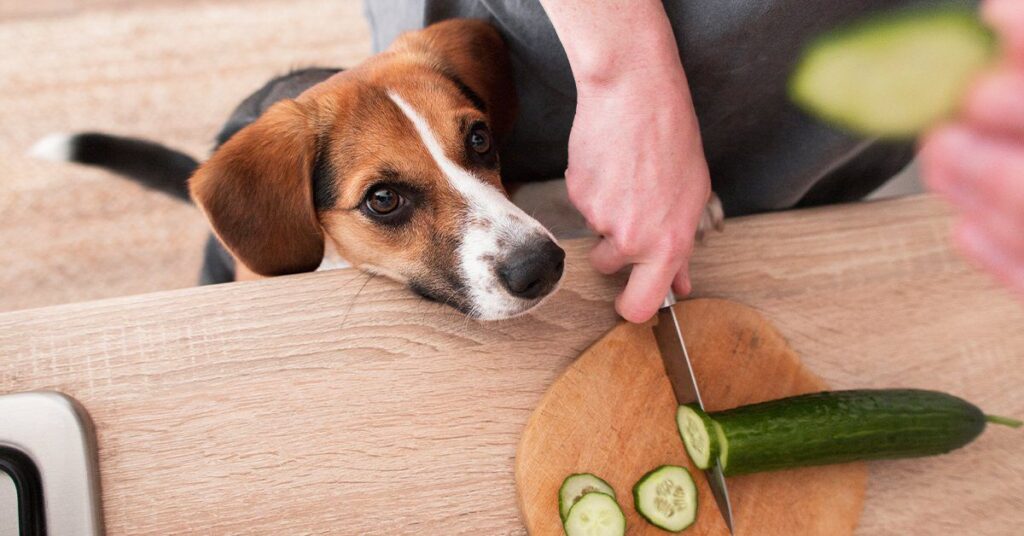- Lynn Guthrie
- Oct 13, 2024
- 7 min read
Key Points:
Yes, dogs can safely eat cucumbers, a healthy, low-calorie treat with vitamin C, vitamin B1, and potassium.
Make sure to chop cucumbers into manageable pieces to prevent choking.
Overconsumption can lead to an upset stomach in dogs.
Ever walked into the kitchen to find your dog munching on a cucumber pulled from a grocery bag? You find them happily gnawing away, and looking quite pleased.
It’s a funny sight, but it raises an important question for many pet parents: Can dogs eat cucumbers?
It's a common scenario that many pet parents can relate to. And it probably sparks even more questions: Are raw cucumbers safe for dogs or should they be washed first? Should I stick to seedless cucumbers? Will I ever be able to leave a grocery bag unattended for a single second? And, most importantly, who’s the bestest good boy in the whole wide world?
For anxious pet parents, we have good news: Dogs can eat cucumbers safelyand even benefit from doing so, as long as they’re properly prepared and eaten in moderation. This post explores the benefits, potential risks, and the safest ways to serve cucumbers to your dog.
The health benefits of cucumbers
Cucumbers are healthy for both humans and dogs alike. They’re packed with water, low in calories, and offer plenty of nutrients.
High water content
Cucumbers are about 95% water, making them the most hydrating solid food you can eat. A half-cup of sliced cucumbers contains about 52 grams, and fully 49.5 of those grams are water. They’re a refreshing snack for dogs in the summertime, in particular.
If you need to increase your dog’s water intake, try feeding them a few slices of cucumber directly or adding them to their water bowl. (Yes, many dogs enjoy cucumber water, too.)
Low calorie count
It’s so hard not to give your pup a treat when they’re giving you those eyes (you know the ones). Luckily, one serving of cucumbers — about 1/2 a cup — is only 7.8 calories, according to the U.S. Department of Agriculture.
Snacking on low-calorie offerings such as cucumbers rather than traditional dog treats can help overweight dogs lose weight. It also helps dogs that are already at a healthy weight stay that way.
Cucumbers’ low-calorie and sugar content also makes them a great snack option for diabetic dogs.
Cucumbers are good for dogs' teeth
While legend has it that the enzymes in cucumber can neutralize odor-causing bacteria in the mouth, there is no published science to back this up. However, chewing crunchy cucumbers mechanically scrapes teeth clean and stimulates saliva production, which, in conjunction with the high water content in cucumbers, can help wash away food particles and odor-causing bacteria.
Nutritional value of cucumbers
Cucumbers are packed with vitamins and minerals that dogs need, including:
Vitamin C: Boosts the immune system and repairs and strengthens body tissue
Vitamin B: improves metabolism and boosts energy
Copper: promotes skin, hair, and connective tissue formation, as well as blood health
Potassium: Boosts electrolytes, improves cell and muscle function, and increases energy
Magnesium: Improves muscle function
Manganese: Helps convert food into energy and fatty acids, and also supports healthy bones and cartilage
Soluble Fiber: Helps food pass through digestive system by absorbing water and promoting good gut bacteria
While your dog should still get most of their dietary needs met with their everyday dog food, fresh cucumber slices add extra water and vitamins to their diet.
How to prepare cucumbers for your dog
While cucumbers are a nutritious snack for your dog, be mindful of how you offer them.
Wash first
Wash cucumbers before feeding them to your dog, just as you would wash them before eating them yourself. This removes any lingering pesticides and contaminants from the vegetable.
Consider removing seeds and peeling
While cucumber seeds are nontoxic, some dogs — especially smaller dogs and puppies — have trouble digesting them, which can lead to gastrointestinal upset. So, to be on the safe side, remove the seeds before feeding.
Peeling the cucumber and removing the ends is another consideration. Cucumber peels contain a lot of nutrients, but, like the seeds, they can be difficult for dogs to digest.
They may also contain small amounts of cucurbitacin, a toxic compound that also naturally occurs in cucumber roots, stems, and leaves. This trace amount is harmless but can leave a bitter taste, so your dog may find a peeled cucumber more palatable.
Slice or cube
Giving your dog a whole cucumber isn’t a good idea, even for a large dog. Swallowing large pieces can cause choking or an intestinal blockage. Slices or cubes are a better choice.
Feed cucumber to dogs in small quantities
Even healthy snacks should make up only a small percentage of your dog’s daily diet to avoid digestive issues.
The best amount of cucumber to feed your dog depends on their size — a Great Dane, Golden Retriever, and Chihuahua all differ in the maximum amount they can comfortably eat. We recommend starting with a few slices, ideally cut to be a quarter-inch thick. Large dogs can safely eat a handful of cucumber slices.
Starting with a small quantity of cucumber also helps you gauge your dog’s tolerance of this vegetable. If they react negatively, they won’t have eaten too much anyway.
Serve cucumbers plain
Many spices and seasonings are harmful to dogs, so think twice before plucking a cucumber out of your salad or entree to sneak to your hungry pal. Any sauce, dressing, or other ingredients you’ve added may have been absorbed into the cucumber.
You also want to steer clear of pickles. While pickles are made from cucumbers, they’re fermented and include salts, seasonings, sugar, and ingredients like garlic or onions that are toxic to your dog.
Even store-bought cucumber water can contain toxic additives such as xylitol, a common sweetener that’s harmless to humans but toxic to dogs.
It’s best to offer your dog raw cucumber in its plain form. However, we'll look at a few other dog-friendly cucumber prep options in a moment.
Creative ways to feed cucumbers to dogs

Here are some fun, diverse serving ideas for feeding cucumbers to your dog:
Use them as a food topper: Chop them up small and spread them across the top of your dog’s regular food to level up their meal.
Dehydrate them: For a chewy snack, dehydrated cucumber bits are another option. The hydration properties are gone, but the nutrients aren’t.
Add them to a fruit/vegetable salad: Mix small pieces of cucumber with other dog-friendly fruits or vegetables to make a tasty fruit salad for your pup.
Make cucumber water: Add a few slices to your dog’s water bowl or make a pitcher of cucumber water to share.
Add them to a Kong toy: Blend a cucumber with other fruits and/or yogurt, pour the blend into a Kong, and freeze it. You can top off the ends with a little peanut butter to prevent the blend from leaking out as it unfreezes.
Other pet-friendly fruit options to consider blending with cucumbers include:
Pet Pro Tip:If you have a dog that is prone to ‘snacksidents’ – you should consider getting a dog insurance plan as soon as possible. It can help you afford the best care in the future by covering eligible vet bills for digestive illnesses, toxic ingestion, and more.
Warning signs for cucumber intolerance
Every dog is unique, including when it comes to food tolerance. This means it’s important to monitor them for signs of an adverse reaction whenever you feed them anything they haven’t eaten before.
If you notice any signs of a food allergy after feeding your dog cucumber, call your vet right away.
Cucumbers: A refreshing snack for dogs
Cucumbers can be a healthy snack for dogs when prepared and served the right way. When in doubt, consult your vet before you give your pooch any new foods.
Even when you’re careful, accidents and adverse reactions can happen. In these situations, having a reliable pet insurance plan on deck can help you stay prepared for a costly vet visit.
Learn more about pet insurance plans from Pumpkin today.
FAQs: Cucumbers and dogs
Are cucumbers good for dog breath?
Despite what you may have heard, no published evidence suggests that the enzymes in cucumbers fight bad doggy breath. According to the veterinarian we consulted for this guide, this can best be classified as an “old wive’s tale.” However, the crunchy texture of this veggie may help scrape teeth clean manually, and in conjunction with the high water content, increase saliva production. Together, this could help wash away some food particles and bacteria that cause bad breath, though other crunchy veggies would have the same effect.
Are cucumber plants toxic to dogs?
The roots, leaves, and stems of cucumber plants contain a toxic chemical compound called cucurbitacin. So, if you have a home garden with cucumbers, fence off the area where they’re growing so that your dog can’t get to them. Trace amounts can get onto the ends and skin of harvested cucumbers, but this small amount is harmless to people and dogs. However, it can leave a bitter taste, so try chopping off the ends and peeling the skin if your dog hesitates to eat it.
Can dogs eat cucumbers with seeds?
Cucumber seeds are non-toxic, but some dogs may have difficulty digesting them. Consider removing the seeds before feeding cucumber to your dog, especially if you have a small breed or puppy.
Can diabetic dogs eat cucumbers?
Yes, cucumbers can be healthy snacks for diabetic dogs since they’re low in calories, sugar, and carbs and high in soluble fiber. Cucumbers don’t have starches, which turn into sugar in your dog’s system. They can also help regulate insulin and blood sugar levels. As always, speak with your vet before giving your diabetic dog any new food.
REFERENCES
DISCLOSURE
Foods that are safe for humans to eat can sometimes be poisonous to pets. Always ask your veterinarian if you're ever unsure whether or not a food is safe for your pet to consume. They will be able to provide you with the most accurate and up-to-date information. Keep in mind that this article is meant to be educational and shouldn't be used as a replacement for professional medical or dietary advice.

